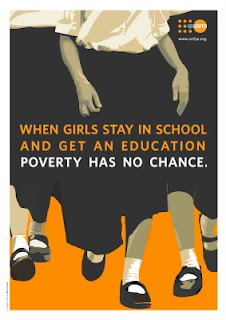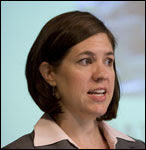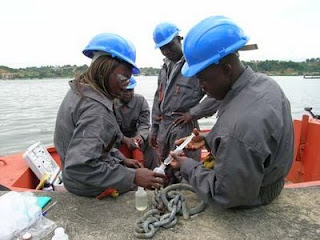-
9.2 Billion Carbon Copies: The Impact of Demography on Climate Change
›July 21, 2009 // By Gib ClarkeAs the number of contributing factors to (and potential solutions for) climate change grows, one—population growth—is conspicuously absent from most discussions. For obvious reasons: After finally prevailing over climate change “skeptics,” why would U.S. climate advocates court more controversy by adding population, and thus family planning and even abortion, to the mix?
Because it could be an important—perhaps significant—and definitely cheap part of solving the climate crisis, argued David Wheeler of the Center for Global Development (CGD) at an ambitious June 23rd event in the CGD series on “Demographics and Development.” Covering both climate change and population issues, he offered a compelling economic analysis of the effectiveness of family planning and female education programs at addressing climate change. Equally impressive was Wheeler’s engaging style, including graphics and animations that could make Gapminder guru Hans Rosling blush.
Describing Pacala and Socolow’s oft-cited “wedge” theory of stabilizing emissions, Wheeler pointed out that slowing population growth is rarely discussed, compared to the more popular—and more costly—wedges related to reduced deforestation, energy efficiency and conservation, renewable electricity and fuels, and carbon capture and storage.
Wheeler argued that slowing population growth has great potential for reduce emissions at a lower cost. As population increases, so do emissions. As a country develops, its per-capita emissions increase, so population increases in more developed countries are especially important. As the middle class in the BRIC and other large developing nations grows, this sizable group of “New Americans” (to use Thomas Friedman’s term) will contribute more and more emissions.
Two interventions will contribute the most to slowing population growth: family planning and female education, said Wheeler. According to his calculations, a $10 billion increase in female education in the developing world would lead to a change in population growth substantial enough to achieve one of the stabilization wedges. Wheeler found that family planning and female education are among the most cost-effective strategies, as evidenced by their placement on the far left side of slides 22 and 25.
Though an economist by training, Wheeler did not make only financial arguments: He emphasized throughout his presentation that family planning and female education are worthy and necessary programs in their own right. And he pointed out the most glaring injustice of climate change: While people in developed countries have the largest carbon footprints, people in developing countries will disproportionately suffer the impacts. (Suzanne Petroni makes similar points in her ECSP Report 13 article, “An Ethical Approach to Population and Climate Change.”)
Tim Wirth, the president of the UN Foundation and the Better World Fund, called for more political and financial support for this link. Funding for family planning has fallen and support for female education is not as high as it should be. Reaching the unmet need of the world’s women would cost about $20 billion, and the U.S. “share” is $1 billion, an amount that many U.S. family planning leaders are advocating.
As CGD’s Rachel Nugent noted in her introduction, demography and climate are classic cases of long-term issues: difficult to understand and address. It is ironic and important, she said, that two such long-term issues are simultaneously at critical moments. The work of David Wheeler on population and climate change, along with that of Leiwen Jiang of Population Action International and Brian O’Neill of the National Center for Atmospheric Research, may help us find an important and inexpensive piece of an elusive and otherwise expensive pie.
More data is needed to confirm these initial findings. However, the devil may not be in the details but in the debate: convincing weary and wary climate warriors to take on a bit more controversy. -
VIDEO: Karen O’Brien on Human Security and the Climate Change Agenda
›July 20, 2009 // By Sean Peoples“Environmental change is not just environment; people are responding to lots of different shocks and stresses simultaneously that really act together to affect capacity to respond,” said Karen O’Brien professor in the Department of Sociology and Human Geography at the University of Oslo and chair of the Global Environmental Change and Human Security (GECHS) project. ECSP Director Geoff Dabelko spoke with O’Brien outside the GECHS conference in Oslo, Norway.
For O’Brien, the GECHS project aims to create “a community of researchers who are showing it is about individuals and communities having the capacity to respond to threats… and pulling environmental change out of the box of just environment and bringing it into issues of development, poverty, vulnerability, etc.” By studying the full spectrum of impacts on individuals and communities, we may learn how to better craft integrated solutions on a macro scale.
Moreover, O’Brien points out that linking research within the hard sciences, social sciences, and humanities can lead to a greater understanding of the underlying issues driving challenges such as climate change. Her new book, Adapting to Climate Change: Thresholds, Values, Governance, presents the latest research on integrated adaptation to climate change and was co-edited with colleagues Neil Adger and Irene Lorenzoni. -
Lithium: Are “Blood Batteries” Next?
›July 17, 2009 // By Geoffrey D. DabelkoThe strategic minerals debate is back—but starring some new rocks. One that has received much recent attention is lithium, which is used in cell phone batteries, as well as those under development for electric cars.
Turns out lithium isn’t found in too many places. Around 50 percent of known reserves are in Bolivia, underneath some very dramatic and desolate salt flats. Worldfocus has a terrific news story that gives a glimpse of the place, the politics, and the battle over lithium extraction. Talk of an OPEC-like lithium cartel with China and Chile suggests that the politics at the international level will be just as contentious as the Bolivian domestic scene.
Our good friends over at the Center for New American Security are taking a fresh and systematic look at the strategic minerals question in their new Natural Security initiative. And we are hearing more and more about it from the advocacy community. For example, ENOUGH has ramped up its Come Clean 4 Congo campaign, which stresses the links between our cell phones, mineral extraction, and continuing violence in the Democratic Republic of the Congo. It is reminiscent of the “blood diamonds” campaigns that led to the Kimberly Process.
The lithium story and the complex social, economic, and political disputes it could engender in Bolivia should flag for us an important consideration in the fight against climate change: trying to do right by climate change and energy security might trigger unforeseen conflicts. Greening our transportation sector with more powerful batteries is going to create a new set of winners and losers around the material inputs like lithium.
We need to be much more cognizant of these impacts as we move forward in addressing climate change and the unsustainable use of fossil fuels. The Wilson Center’s Environmental Change and Security Program will be tackling this specific dimension of the climate and security debates—the potential for conflict induced by climate mitigation efforts—in the months ahead. -
Weekly Reading
›“A warming planet will spread disease, shrink water resources, and deplete crops, creating conditions that produce more famine and more conflict,” said President Barack Obama in Accra, Ghana, on his first trip to sub-Saharan Africa. “All of us–particularly the developed world–have a responsibility to slow these trends–through mitigation, and by changing the way that we use energy. But we can also work with Africans to turn this crisis into opportunity,” he went on to say.
The United Kingdom’s Department for International Development (DFID) released “Eliminating World Poverty: Building Our Common Future,” a white paper setting its goals for poverty alleviation and sustainable development, including improving climate change adaptation and reproductive health services in developing countries.
In Foreign Policy, Richard Cincotta compares Iran’s youth bulge and democratic reform movement with the experience of China 20 years ago, concluding that the conservative government’s ruthless response will impede the development of durable liberal democracy.
The Natural Resources Defense Council reports that global warming is exacerbating the spread of mosquito-borne dengue fever in the Americas. Harvard’s Dr. Paul Epstein recently discussed similar incidences of climate change-related disease proliferation at the Wilson Center.
In “Well Oiled: Oil and Human Rights in Equatorial Guinea,” Human Rights Watch “details how the dictatorship under President Teodoro Obiang Nguema Mbasogo has used an oil boom to entrench and enrich itself further at the expense of the country’s people.” -
Strength in Numbers: Can “Girl Power” Save Us From the Financial Crisis?
›July 15, 2009 // By Meaghan Parker To promote the 20th World Population Day on July 11, the United Nations Population Fund (UNFPA) tied this year’s theme—“Fight Poverty: Educate Girls”—to combating the ongoing financial crisis. It’s a no-brainer that, as UNFPA points out, “women and children in developing countries will bear the brunt of the impact.”
To promote the 20th World Population Day on July 11, the United Nations Population Fund (UNFPA) tied this year’s theme—“Fight Poverty: Educate Girls”—to combating the ongoing financial crisis. It’s a no-brainer that, as UNFPA points out, “women and children in developing countries will bear the brunt of the impact.” -
Climate Disequilibrium Puts Human, Ecological Health at Risk
›July 14, 2009 // By Brian Klein The growing concentration of atmospheric carbon has punctured Earth’s climate equilibrium, said Dr. Paul Epstein, pushing the planet toward rapid transitions with serious implications for human and ecological health. Epstein, associate director of Harvard’s Center for Health and the Global Environment, spoke with Amanda Staudt, a climate scientist from the National Wildlife Federation, at an event hosted by the Woodrow Wilson Center’s Environmental Change and Security Program on June 16, 2009.
The growing concentration of atmospheric carbon has punctured Earth’s climate equilibrium, said Dr. Paul Epstein, pushing the planet toward rapid transitions with serious implications for human and ecological health. Epstein, associate director of Harvard’s Center for Health and the Global Environment, spoke with Amanda Staudt, a climate scientist from the National Wildlife Federation, at an event hosted by the Woodrow Wilson Center’s Environmental Change and Security Program on June 16, 2009.
Climate Change Is Accelerating Global warming appears to be advancing more quickly than predicted, Staudt cautioned, because “the developed world isn’t reducing their emissions as quickly as anticipated…there are more and more emissions from the developing world, and they’re increasing faster than expected…[and] some of our natural sinks are less efficient than what we had thought.” Epstein cited a 2000 NOAA study showing that “the oceans have warmed 20 times as much as has the atmosphere” over the past half-century, altering Earth’s hydrological cycle and thus accelerating climate change.
Global warming appears to be advancing more quickly than predicted, Staudt cautioned, because “the developed world isn’t reducing their emissions as quickly as anticipated…there are more and more emissions from the developing world, and they’re increasing faster than expected…[and] some of our natural sinks are less efficient than what we had thought.” Epstein cited a 2000 NOAA study showing that “the oceans have warmed 20 times as much as has the atmosphere” over the past half-century, altering Earth’s hydrological cycle and thus accelerating climate change.
No matter how drastically greenhouse gas emissions are cut, both experts warned, a litany of irreversible changes—including an increase in global average temperature and extreme weather events, desertification, sea-level rise, and species extinction—will continue.
Infectious Disease Increases A warming climate will increase the range of many diseases, Epstein explained. “The clearest signal we have in terms of infectious disease is in the mountains of Africa, Asia, and Latin America,” he said. “What we’re seeing in Kilimanjaro, in the Tibetan Plateau, in the Andes, is that glaciers are retreating, plant communities are upwardly migrating, and mosquitoes that cause malaria, dengue fever, and so on are circulating at higher altitudes” and latitudes further from the equator. For example, malaria has appeared in Nairobi, a mile-high city, and chikungunya fever—previously confined to Indian Ocean littoral states—induced panic and warranted a front-page New York Times article when several residents of a small Italian town contracted it in 2007.
A warming climate will increase the range of many diseases, Epstein explained. “The clearest signal we have in terms of infectious disease is in the mountains of Africa, Asia, and Latin America,” he said. “What we’re seeing in Kilimanjaro, in the Tibetan Plateau, in the Andes, is that glaciers are retreating, plant communities are upwardly migrating, and mosquitoes that cause malaria, dengue fever, and so on are circulating at higher altitudes” and latitudes further from the equator. For example, malaria has appeared in Nairobi, a mile-high city, and chikungunya fever—previously confined to Indian Ocean littoral states—induced panic and warranted a front-page New York Times article when several residents of a small Italian town contracted it in 2007.
Extreme weather events help diseases proliferate. Heavy rainfall drives sanitation into clean water supplies, spreading E. coli, cryptosporidium, and other waterborne pathogens. Drought, meanwhile, has facilitated meningitis epidemics in Africa’s Sahel region and the spread of disease-bearing mosquitoes that breed in buckets of water stored during periods of water scarcity.
Assault on Forests, Agriculture
Climate shifts have important consequences for the health of forests and agriculture. The “absence of killing frosts means that [mountain pine] beetles are overwintering, moving to higher altitudes, moving to higher latitudes, even getting in more generations each year,” Epstein said. Drought “dries the resin that drowns the beetles as they try to drive through the bark,” leaving pines trees in the Rocky Mountain Range vulnerable and posing acute economic and ecological challenges to dependent communities.
The higher frequency of droughts, floods, and heat waves, coupled with the spread of weeds, pests, and pathogens, could reduce agricultural production. In addition, studies have shown that many food crops (including cassava) contain higher levels of cyanide at earlier stages of growth as carbon concentrations rise, putting people who ingest them at risk.
Healthy Solutions to Climate Change
To address these challenges, several “stabilization wedges” with inherently healthy characteristics—forest conservation and restoration; agriculture reform; energy efficiency; and wind, solar, and geothermal power production—should be prioritized, Epstein advised. Other, less healthy options—including biofuels, nuclear power, and fossil fuel-based technologies—should undergo thorough lifecycle analyses before winning endorsement, he said.
The design and construction of healthy cities—“green roofs, green buildings, tree-lined streets, biking lanes, walking paths, open space, smart growth, public transport”—as well as a smart energy grid is an essential part of the solution, said Epstein. Countries should also move away from deregulation, privatization, and liberalization of the economy in favor of a system that contains sufficient regulation, public-private partnerships, and appropriate constraints.
“If we do this right,” Epstein concluded, “it can be good for public health, good for security, good for the economy, and we certainly hope it’ll stabilize the climate.”
Top Photo: Red, dying trees signal the spread of beetle infestations in the pine forests of Manning Park, British Columbia. Courtesy Flickr user Tim Gage.
Photos of Amanda Staudt and Dr. Paul Epstein courtesy Dave Hawxhurst and the Woodrow Wilson Center. -
Post-Conflict Recovery in Biodiversity Hotspots
› The prevalence of armed conflict in areas of high biodiversity is alarming, though not entirely surprising. According to “Warfare in Biodiversity Hotspots” (abstract online), which was published earlier this year in Conservation Biology, 80 percent of the major armed conflicts between 1950 and 2000 took place in biodiversity hotspots. While natural resources are rarely the principal causes of conflict, their allocation and ownership are frequently among its drivers.
The prevalence of armed conflict in areas of high biodiversity is alarming, though not entirely surprising. According to “Warfare in Biodiversity Hotspots” (abstract online), which was published earlier this year in Conservation Biology, 80 percent of the major armed conflicts between 1950 and 2000 took place in biodiversity hotspots. While natural resources are rarely the principal causes of conflict, their allocation and ownership are frequently among its drivers. -
VIDEO: Neil Adger on Adapting to Climate Change
›July 9, 2009 // By Sean Peoples“We can adapt to climate change… and there are lots of opportunities for change, lots of things that would be harmonious with sustainable development,” said Neil Adger, a professor at the University of East Anglia and leading researcher on adaptation at the Tyndall Centre for Climate Change Research in the UK. “But saying we can change and can adapt does not mean to say we necessarily will adapt to climate change.”
In this short video, ECSP Director Geoff Dabelko speaks with Adger outside the Global Environmental Change and Human Security conference in Oslo, Norway. As an environmental economist, Adger believes the need to mitigate and adapt to current and future climate shifts is unambiguous. Adger recently co-edited a new book with colleagues Irene Lorenzoni and Karen O’Brien, entitled Adapting to Climate Change: Thresholds, Values, Governance, in which they present the latest interdisciplinary research on adaptation.
Adger warns against relying on geo-engineering, or rearranging Earth’s atmospheric dynamics, as a “get-out-of-jail-free card.” He says “there are significant inherent dangers with just about every serious geo-engineering technology being discussed.”
For more information regarding geo-engineering, read The Climate Engineers, an essay by former Woodrow Wilson Center Public Policy Scholar James Fleming, which discusses the evolution of radical ideas to control atmospheric patterns.
 A Publication of the Stimson Center.
A Publication of the Stimson Center.


 To promote the 20th World Population Day on July 11, the United Nations Population Fund (UNFPA) tied this year’s theme—
To promote the 20th World Population Day on July 11, the United Nations Population Fund (UNFPA) tied this year’s theme— The growing concentration of atmospheric carbon has punctured Earth’s climate equilibrium, said Dr. Paul Epstein, pushing the planet toward rapid transitions with serious implications for human and ecological health. Epstein, associate director of Harvard’s
The growing concentration of atmospheric carbon has punctured Earth’s climate equilibrium, said Dr. Paul Epstein, pushing the planet toward rapid transitions with serious implications for human and ecological health. Epstein, associate director of Harvard’s  Global warming appears to be advancing more quickly than predicted, Staudt cautioned, because “the developed world isn’t reducing their emissions as quickly as anticipated…there are more and more emissions from the developing world, and they’re increasing faster than expected…[and] some of our natural sinks are less efficient than what we had thought.” Epstein cited a
Global warming appears to be advancing more quickly than predicted, Staudt cautioned, because “the developed world isn’t reducing their emissions as quickly as anticipated…there are more and more emissions from the developing world, and they’re increasing faster than expected…[and] some of our natural sinks are less efficient than what we had thought.” Epstein cited a  A warming climate will increase the range of many diseases, Epstein explained. “The clearest signal we have in terms of infectious disease is in the mountains of Africa, Asia, and Latin America,” he said. “What we’re seeing in Kilimanjaro, in the Tibetan Plateau, in the Andes, is that glaciers are retreating, plant communities are upwardly migrating, and mosquitoes that cause malaria, dengue fever, and so on are circulating at higher altitudes” and latitudes further from the equator. For example, malaria has appeared in Nairobi, a mile-high city, and chikungunya fever—previously confined to Indian Ocean littoral states—induced panic and warranted a
A warming climate will increase the range of many diseases, Epstein explained. “The clearest signal we have in terms of infectious disease is in the mountains of Africa, Asia, and Latin America,” he said. “What we’re seeing in Kilimanjaro, in the Tibetan Plateau, in the Andes, is that glaciers are retreating, plant communities are upwardly migrating, and mosquitoes that cause malaria, dengue fever, and so on are circulating at higher altitudes” and latitudes further from the equator. For example, malaria has appeared in Nairobi, a mile-high city, and chikungunya fever—previously confined to Indian Ocean littoral states—induced panic and warranted a  The prevalence of armed conflict in areas of high biodiversity is alarming, though not entirely surprising. According to “
The prevalence of armed conflict in areas of high biodiversity is alarming, though not entirely surprising. According to “

